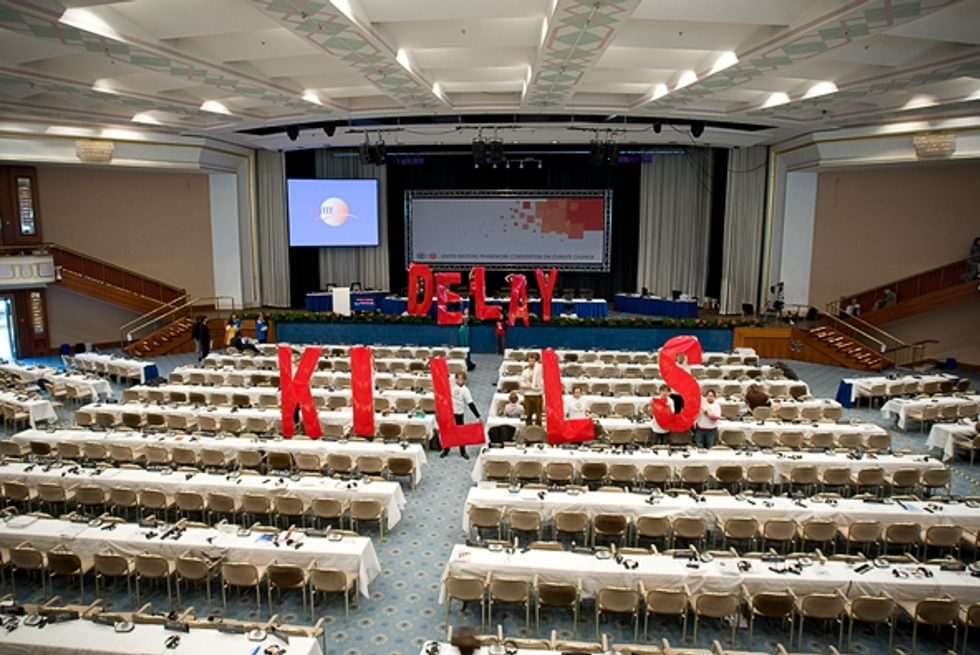
This Hot Spots series critically examines the global apparatus of climate change governance, through ethnographic analysis of the United Nations Framework Convention on Climate Change (UNFCCC)’s Conference of Parties (COP)—and beyond. These essays throw new light on climate negotiations from diverse spaces, by examining: institutional structures and practices of international civil servants, delegates, experts and negotiators; the technopolitical work of climate governance models, thematic trends, spatial rhetoric and emissions accounting measures for self-interested nation-states; popular demands to address loss and damage through decolonization, plurinational democracy, and Indigenous knowledge and science; as well as significant absences that expose unresolved tensions between and among environmental justice movements, national governments, and corporate interests. This series features ethnographic narratives bridging these spaces and imaginaries, from the official UNFCCC negotiation zone and the knowledge it produces to parallel climate summits led by Indigenous peoples, environmental activists, and civil society groups. Our ethnographic observations suggest that, far from a unified global voice, the different parties involved in climate negotiations present vital yet incompatible political responses to the crisis, based on uneven forms of inclusion and exclusion in scenarios of just, equitable and sustainable development.
Posts in This Series

Introduction: Negotiating the Crisis
Anthropology has documented the severity of the climate crisis in frontline hot spots around the world, drawing important attention to the need for adaptation a... More

The Coloniality of Global Climate Governance
December 2018: Along with twenty-two thousand fellow travelers, I arrived in Katowice, Poland to partake in the annual global climate negotiations—formally know... More

Everyday Inequalities at COP26: The Slow Violence of Negotiating Loss and Damage at the UNFCCC
“I will not negotiate past 7 p.m. It will take us two hours to get home. I want to ensure we get enough rest, at least during the first week.” Negotiations had ... More

Encountering the Climate Regime: “Useful” Climate Knowledge and the Work of Forecasts
The processes of knowledge production and circulation bound up with the United Nations Framework Convention on Climate Change (UNFCCC) run alongside those of ot... More

Indefinite Accounting: Inventorying Greenhouse Gas Emissions in Minas Gerais, Brazil
How much gas is emitted? It seems like a simple question, and answering it concretely is the foundation for many climate governance meetings, ranging from local... More

A Journey into Model Land
Climate change policy-making is nothing without climate models. At global, national, and local levels, climate models of different kinds—from General Circulatio... More

The Discipline of the Badge: Research and Protest at the UN Climate Negotiations
Given the severity of the climate crisis and increasingly urgent warnings from the scientific community that we are running out of time to prevent dangerous cli... More

Responding to Political Uncertainty at the United Nations Framework Convention on Climate Change Conference
The 2016 US Presidential elections took place on the second day of the 22nd Conference of the Parties (COP22) of the United Nations Framework Convention on Clim... More

Climate Change as Vocation
“The ideas of science appear to be an otherworldly realm of artificial abstractions that strive to capture the blood and sap in their scrawny hands without ever... More

The Felt Irony of Negotiation Support
Rose (a UN officer): Rushing into the temporary UN COP offices in Madrid. “Turkey is demanding a pencil. Does anyone have a pencil for me?” Mika (another UN off... More

Absences: Thematic Exclusions at a United Nations Framework Convention on Climate Change Conference
The 18th Conference of the Parties (COP) of the United Nations Framework Convention on Climate Change (UNFCCC) was held in 2012 in Doha, Qatar. Conducting ethno... More

Methane Pledges and the Future of Hydropower
In the opening days of the United Nations Framework Convention on Climate Change (UNFCCC)’s 26th Conference of the Parties (COP26), more than 100 countries sign... More

New Mitigation Markets and Green Abstractivisms
Mineral and energy resource exploitation allows many countries of the global periphery to present themselves as sinks or suppliers of quantifiable and tradable ... More

Plurinational Climate Action: Environmental Governance Beyond Green Extractivism
In December 2019, Chile was scheduled to host the United Nations Framework Convention on Climate Change (UNFCCC)’s 25th Conference of the Parties (COP25) in San... More